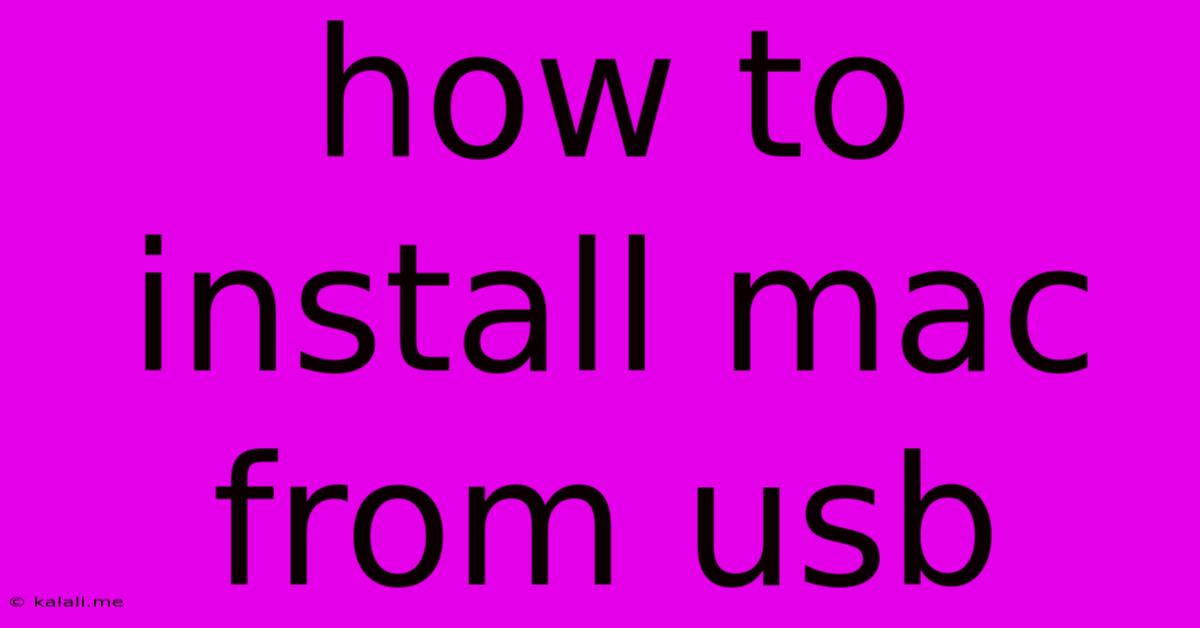How To Install Mac From Usb
Kalali
Jun 03, 2025 · 4 min read

Table of Contents
How to Install macOS from a USB Drive: A Comprehensive Guide
Meta Description: Learn how to create a bootable macOS installer on a USB drive and perform a clean installation of macOS. This comprehensive guide covers all steps, troubleshooting common issues, and ensuring a smooth process.
Installing macOS from a USB drive is a valuable skill, whether you're performing a clean install, upgrading to a newer version, or troubleshooting a problematic system. This method offers more control and flexibility compared to a traditional installation from the recovery partition. This guide will walk you through the entire process, from creating the bootable installer to completing the installation.
What You'll Need
Before you begin, ensure you have the following:
- A Mac: This might seem obvious, but it's crucial! You need a Mac to create the bootable installer.
- A USB drive: This should have at least 16GB of storage and be formatted as Mac OS Extended (Journaled). Important: All data on the USB drive will be erased, so back up any important files beforehand.
- macOS installer: You'll need the macOS installer app. You can download this from the Mac App Store or create it from a recovery partition. The version you download will determine the macOS version you install.
- A little patience: The process can take some time, especially creating the bootable installer.
Creating the Bootable macOS Installer
This is the most crucial step. Here's how to do it:
-
Download the macOS Installer: Download the macOS installer application from the Mac App Store or through your Apple ID.
-
Format the USB Drive: Open Disk Utility (found in
/Applications/Utilities/). Select your USB drive from the sidebar. Click on the "Erase" button. Choose "Mac OS Extended (Journaled)" as the format and give it a name (e.g., "macOS Installer"). Click "Erase". -
Use the
createinstallmediacommand: This is a command-line utility that simplifies the process significantly. Open Terminal (found in/Applications/Utilities/). Enter the following command, replacing/path/to/installer.appwith the actual path to your macOS installer application and/path/to/your/usbwith the path to your USB drive. You'll need to find the path by selecting your drive in Finder and then copying its location from the top bar. Remember to confirm the paths are correct before executing the command.sudo /Applications/Install\ macOS\ Monterey.app/Contents/Resources/createinstallmedia --volume /path/to/your/usb --nointeraction(Replace
Install macOS Monterey.appwith the name of your installer app. The--nointeractionflag automates the process; omit it for more interactive prompts.) -
Wait for Completion: The process will take some time, potentially an hour or more, depending on your hardware and the size of the macOS installer. Do not interrupt the process.
Installing macOS from the USB Drive
Once the bootable installer is created, you're ready to install macOS:
-
Connect the USB Drive: Connect the USB drive to the Mac you want to install macOS on.
-
Restart your Mac: Turn off your Mac and then turn it back on, immediately pressing and holding the Option key. This will bring up the Startup Manager.
-
Select the USB Drive: Select your USB drive (it will likely be named after the name you gave it during formatting, e.g., "macOS Installer") and press Return.
-
Follow the On-Screen Instructions: The macOS installer will launch. Follow the on-screen instructions to complete the installation. This includes choosing your language, agreeing to the license agreement, selecting a disk, and setting up your user account.
-
Complete the Setup: Once the installation is complete, your Mac will restart, and you'll be guided through the initial setup process.
Troubleshooting
- The USB drive isn't recognized: Ensure the USB drive is properly connected and formatted correctly. Try a different USB port.
- The installer fails to start: Try creating the bootable installer again, ensuring you use the correct command-line arguments and paths.
- The installation process freezes: This could be due to a hardware problem or a corrupted installer. Try repeating the process.
By following these steps, you can successfully install macOS from a USB drive, giving you a clean, fresh installation of your operating system. Remember to always back up your data before starting any major system changes.
Latest Posts
Latest Posts
-
What Is The Black Terminal On A Light Switch
Jun 05, 2025
-
My Sourdough Starter Smells Like Alcohol
Jun 05, 2025
-
How Hot Is A Lightning Bolt
Jun 05, 2025
-
Chapter 7 Review Challenge Problems Aops Prealgebra
Jun 05, 2025
-
When In The Namek Saga Did Everyone Get Revived
Jun 05, 2025
Related Post
Thank you for visiting our website which covers about How To Install Mac From Usb . We hope the information provided has been useful to you. Feel free to contact us if you have any questions or need further assistance. See you next time and don't miss to bookmark.